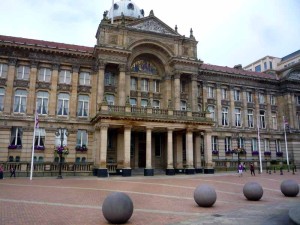If Birmingham voters reject the mayoral route, the city council would be allowed to return to a Leader and Cabinet-style system of government, Labour’s Phil Davis believes that it should.
 As the mayoral referendum draws near, the government’s failure to identify what powers will be devolved to elected mayors is a problem for the ‘Yes’ campaign. Virtually nothing is on offer, other than the unspecified restoration of several funding streams lost to central government cuts since 2010. To divert attention from this, ‘Yes’ campaigners make grand comparisons with mayoral systems elsewhere in Europe and North America.
As the mayoral referendum draws near, the government’s failure to identify what powers will be devolved to elected mayors is a problem for the ‘Yes’ campaign. Virtually nothing is on offer, other than the unspecified restoration of several funding streams lost to central government cuts since 2010. To divert attention from this, ‘Yes’ campaigners make grand comparisons with mayoral systems elsewhere in Europe and North America.
But these mayors work in federal or devolved systems, with real powers over local taxes, police, fire and other major strategic services; if not alone, then in partnership with similarly powerful elected regional governments. The distribution of powers is set by a constitution, which means that, unlike in England, local government is not the plaything of national politicians. Despite David Cameron’s fatuous claim that the mayoral referendums present our cities with: “a change of a lifetime”, no such constitutional settlement is on offer to Birmingham’s electorate.
In fact, a growing number of voters are echoing Lord Digby Jones’s view that the wrong question entirely has been posed. What we actually need is a vote on bringing back elected regional government to the West Midlands. Until 1986 we had devolved regional government in the shape of the West Midlands County Council, covering the seven West Midlands boroughs and cities. The County ran fire, police, transport and strategic planning services and spoke for the region. There is a case for an elected body serving the wider urban/shire region, bringing in economic and transport links with the shire counties. This was the basis on which Regional Development Agency, Advantage West Midlands, worked along with the (also abolished) West Midlands Regional Assembly (an indirectly elected partnership body). There are 3.2 million people in the conurbation and 5 million in the wider West Midlands urban/shire region and it is a national scandal that in England only London is thought worthy of its own elected regional government.
Irrespective of the mayoral referendum result, the issue of returning London-style regional powers to the West Midlands will not go away. The Government has enlivened this debate with the inaugural election of a West Midlands Police Commissioner. This once again establishes the principle of an elected authority running regional services that are too big for a single city council to manage. If police, why not fire, transport and economic regeneration powers for the conurbation? Whatever the referendum result it will be up to those of us seeking genuine localism and accountability to get together and call for meaningful powers and meaningful change.
To achieve this it will be necessary to reverse one of the negative trends in local government – bad for both accountability and debate – the concentration of powers in a small group of councillors via the Leader and Cabinet system, introduced by New Labour in 2000. This cut off large swathes of councillors from participation in decision-making via service committees, shunting them instead into monitoring roles (commonly known as Overview and Scrutiny). Dictatorial systems dislike committees because they require shared responsibility and holding to account. They are also the key training ground for the next generation of leaders. An elected mayor is another ratchet away from accountable government and risks further impoverishing debate and policy development.
If Birmingham votes “No” on May 3rd and Labour controls the Council, the new leadership should commit to review the Leader/Cabinet system. An effective leader – Dick Knowles comes to mind – will always make the committee system work, by force of personality and ideas. Birmingham’s late 1980s/early 1990s regeneration was set in train under Dick as a traditional council leader, just as a century earlier Birmingham was internationally recognised as, ‘the best governed city in the world’ under roughly the same system of majority party control. Good leaders make a difference, poor leaders don’t. But unlike an elected mayor, the council leader has to persuade and include colleagues in a much more open process of government, with clearer accountability to the ultimate source of power, Birmingham’s citizens.
Phil Davis is Labour candidate for Billesley ward and former Leader of Telford and Wrekin Council.


